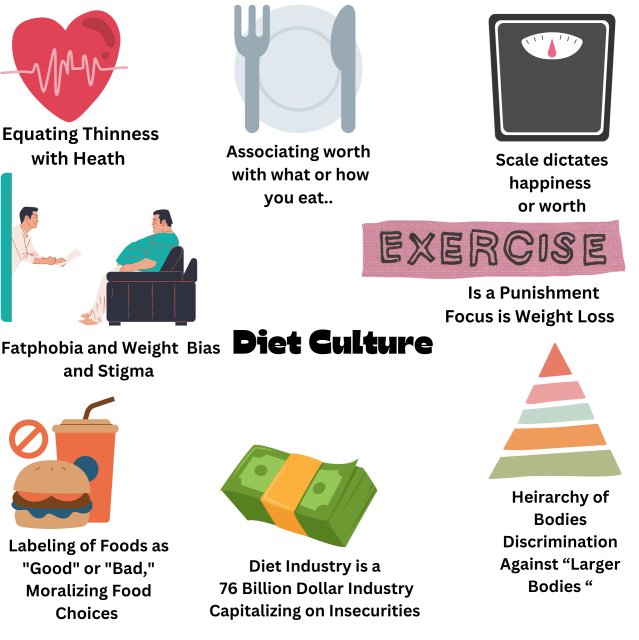Body Image
Unmasking Diet Culture
How diet culture slips into our lives, and how to combat it.
Posted July 29, 2024 Reviewed by Gary Drevitch
Key points
- Diet culture promotes thinness as the ultimate standard of health and success, affecting self-worth.
- Social media and advertising perpetuate unrealistic beauty standards, fueling insecurities and diet trends.
- Restrictive diets and weight-centric wellness approaches can be harmful to individuals and society.
Diet culture is a pervasive force in our society. There is no universally accepted definition of diet culture but understanding its core characteristics can help us recognize how sneaky it is and how it infiltrates our lives in ways we might not realize. Here are some defining traits:
- A societal system that values thinness and equates it with health, beauty, and success.
- A belief system that promotes restrictive eating and a strict exercise regimens to achieve a specific body size or shape.
- A culture that perpetuates the notion that certain foods are "good" or "bad" and moralizes food choices.
- A set of beliefs and behaviors that reinforce weight stigma and discrimination against individuals in "larger" bodies.
- It is a multi-billion dollar industry that profits off of individuals' insecurities and perpetuates the myth of the "perfect" body.

Diet culture subtly but persistently pushes the narrative that thinner is better and that our worth is tied to our weight. Understanding how diet culture infiltrates our lives and learning how to combat it is vital for our mental and physical well-being. Here's a look at how diet culture sneaks into our lives, why we should reject it, and effective ways to fight back.
How Diet Culture Slips Into Our Lives
- Media and Advertising: We're bombarded with images and messages promoting the thin ideal. Advertisements for weight-loss products, fitness programs, and "before and after" photos flood our social media feeds, television screens, and magazines. These messages reinforce the idea that happiness and success are tied to being slim. This relentless marketing profits from our insecurities and perpetuates the unrealistic beauty standards many strive to achieve.
- Social Media Platforms: Social media platforms are a hotbed for diet culture, with influencers and celebrities often promoting restrictive diets, detox teas, and unrealistic body standards. Constantly comparing ourselves to these curated lives can make us feel inadequate and pressure us to conform. Moreover, many influencers are paid to promote these products, making it difficult to discern genuine endorsements from profit-driven claims. This sneaky marketing capitalizes on our vulnerabilities and perpetuates the constant need to "improve" ourselves according to unrealistic standards.
- Everyday Conversations: Diet talk is pervasive in everyday conversations. Friends, family, and colleagues might casually discuss their latest diet, weight loss efforts, or body dissatisfaction. These conversations normalize the preoccupation with weight and reinforce the idea that dieting is a necessary part of life.
- Fitness and Wellness Industry: Many fitness programs and wellness trends are rooted in diet culture, emphasizing weight loss over overall health and connecting one's weight to moral virtue. Terms like "burning calories" or "earning your food" are standard in workout environments, perpetuating the idea that exercise is primarily for weight control and reinforcing the notion that food must be "earned" through physical activity.
- Healthcare Settings: Diet culture can be prevalent even in healthcare. Medical professionals may focus on weight as a primary indicator of health, sometimes overlooking other essential aspects of well-being. This can lead to weight stigma and a subsequent feeling of shame, which discourages people from seeking necessary medical care.
Reasons to Reject Diet Culture
- Mental Health: Diet culture contributes to anxiety, depression, and low self-esteem. Constantly striving for an unrealistic body ideal can lead to a negative relationship with food and body image and develop into an eating disorder.
- Physical Health: Restrictive diets harm your body. They often lead to nutrient deficiencies and metabolic slowdown and can increase the risk of developing eating disorders. Sustainable health is better achieved through balanced, intuitive eating and regular physical activity that you enjoy.
- Body Diversity: Diet culture promotes a narrow standard of beauty that doesn't celebrate body diversity. Embracing all body shapes and sizes encourages self-acceptance and a healthier society in which everyone feels valued regardless of appearance.
- False Promises: Diet culture often promises quick fixes and miraculous results, but the reality is that most diets fail in the long term. Many people regain the weight they lose, leading to a harmful cycle of yo-yo dieting and diminished self-worth. It is empowering to recognize that these messages are profit-driven rather than health-driven.
Ways to Combat Diet Culture
- Curate Your Media Consumption: Be mindful of the media you consume. Unfollow social-media accounts that promote diet culture and follow those that advocate for body positivity, body neutrality, body appreciation, body liberation, and health at every size (HAES). Seek out content that uplifts and empowers you.
- Change the Conversation: When conversations turn to diet talk, gently steer them in a different direction. Share information about the dangers of diet culture and the benefits of a holistic approach to health. Encourage discussions that focus on well-being rather than weight.
- Explore Intuitive Eating: Intuitive eating encourages you to listen to your body's internal cues without judgment rather than following restrictive diets. It promotes a healthy relationship with food, allowing you to enjoy eating without guilt or shame.
- Educate Yourself: Learn about the origins and impacts of diet culture. Reading books, listening to podcasts, and attending workshops can deepen your understanding and give you the tools to resist its influence.
- Advocate for Change: Support organizations and policies that promote acceptance and appreciation of body diversity and challenge diet culture. Engage in activism that calls for change in how media, healthcare, and the wellness industry address weight and health.
Embracing a Trusting Relationship with Your Body
Rejecting diet culture is a powerful step toward reclaiming your body and self-worth. Understanding how it infiltrates our lives and taking active steps to combat it can foster a culture that values health, diversity, and genuine well-being over unrealistic and harmful body standards. Embrace your uniqueness and nurture a relationship of trust with your body. It's the most radical act of self-love you can perform.
Diet culture perpetuates eating disorders in many ways, preventing people from trusting their instincts around their bodies and choices. Reimagining one's body as something to be trusted requires education about this learned system that commandeered that body trust in the first place. Learning that the "thin ideal," food trends, and some dietary recommendations are socially constructed and motivated by profit and consumerism is empowering. It allows one to more readily reject messaging that there is one right way to eat and that their body is the problem.
How could individuals not feel ashamed of their bodies or food choices when diet culture's job was to create a feeling of inadequacy? The diet culture rollercoaster, which has instilled in individuals the belief that their bodies must change to be considered acceptable and attractive, can only be confronted when the blame is removed from oneself and those around them. Stop seeing failure to lose weight or keep it off as a personal failure. Everyone has been affected by diet culture's toxic messages; everyone has been a victim. Increasing self-compassion can help break this cycle, allowing individuals to see themselves and others with more kindness and understanding.
Each person has the potential to become a proverbial lighthouse, guiding others toward healing. By strengthening their skills and reducing the influence of diet culture on themselves, one can create a ripple effect that positively impacts the healing process of others.


